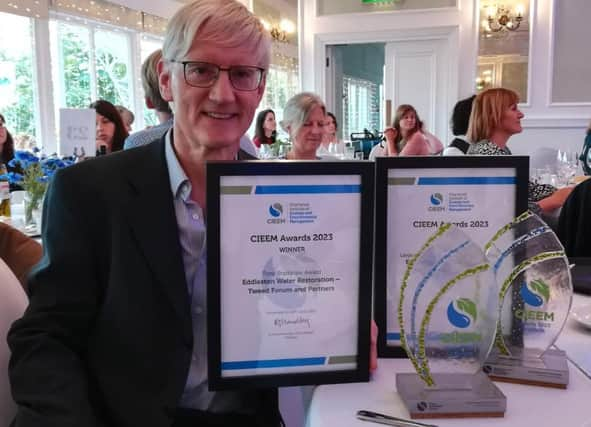Eddleston project reaps double award


The UNESCO-recognised initiative is a living laboratory that’s collecting evidence of the benefits of nature-based solutions to deliver reduced flood risk and enhanced biodiversity across the 69km² Eddleston Water catchment, while also maintaining sustainable livelihoods for local farmers.
Tweed Forum and its project partners won the CIEEM Best Practice Award for Large-Scale Practical Nature Conservation, as well as the Tony Bradshaw Award – an accolade selected from all the best practice winners which recognises an exceptional project that sets an impressively high standard.
Advertisement
Hide AdAdvertisement
Hide AdLuke Comins, director of Tweed Forum, said: “The CIEEM is the professional body for ecologists and environmental managers right across the UK and Ireland so to be recognised by a body of our peers is extremely rewarding and demonstrates the high quality of the work carried out by our staff and project partners.
"Our Eddleston Water project is internationally significant and shows how the restoration of natural processes can increase flood resilience and help restore natural habitats. In doing so, we can help respond to the biodiversity crisis and our changing climate where extreme weather events such as flooding are becoming more frequent.
"We’re delighted that our work is playing such an important role in helping scientists, policy makers and practitioners understand how we can restore ecosystems and future proof the landscape in the face of these challenges.”
Tweed Forum’s Eddleston Water project was started in 2010. Since then, the measures implemented across the catchment include the creation of 38 new ponds to catch and temporarily store surface water flow, and the re-meandering of some 3.5km of once-straightened river channels.
Advertisement
Hide AdAdvertisement
Hide AdThe ponds are providing new wetland habitats for amphibians and dragonflies, whilst re-meandering has enhanced the structural and habitat diversity of the river channels. Over a hundred engineered log structures have been created on streams in the upper catchment. Built to allow fish to pass underneath, these slow excess water by directing it into land on either side of the river channel.
More than 330,000 native trees have been planted across the catchment providing not only a direct biodiversity benefit and positive impact on ecology, but also sequestering carbon. In time, these will also aid water infiltration in upstream areas where floods are generated and will help to slow overland water flows.
There has also been a rise in fish numbers due to increasing the channel length through re-meandering, and a recovery in the diversity and numbers of aquatic invertebrates in response to the range of new habitats created. Threatened species including kingfishers, dippers, lampreys and otters will also benefit from improvements to these river habitats, whilst monitoring of the ponds has shown they are at least as diverse as conservation ponds created elsewhere in the UK.
The Eddleston Water project is delivered in collaboration with the University of Dundee, British Geological Services, local farmers and the surrounding community and is funded by the Scottish Government, EU Interreg and the Scottish Environment Protection Agency
www.tweedforum.org